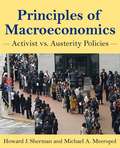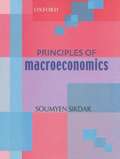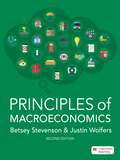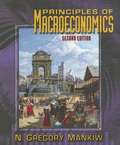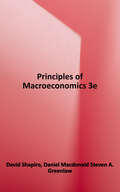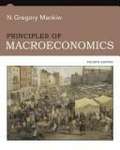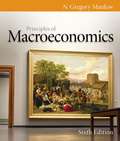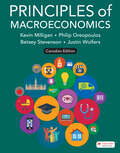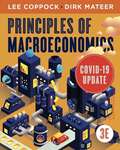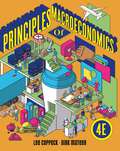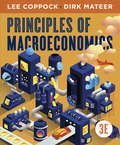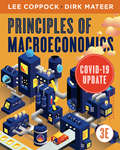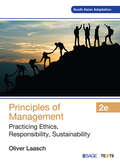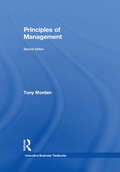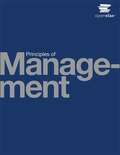- Table View
- List View
Principles of Macroeconomics: Activist vs Austerity Policies
by Howard Sherman Michael A MeeropolPrinciples of Macroeconomics by Howard J. Sherman and Michael A. Meeropol differs from other texts in that this book stresses far more the inherent instability of the macro-economy. The details of the business cycle come early and are integrated throughout the core of usual macro topics (C, I, G, X). The book puts inflation into its proper perspective by recognising that unemployment is the much greater threat to the economic well being of the vast majority of the people. Instead unemployment and its human toll are given far greater emphasis than other texts. The Keynesian model is fully developed; so is the statistical analysis of Wesley Mitchell. The neoclassical model is covered in both its historical evolution and in its implications for current policy debates. Finally, there is strong coverage of the Euro-zone crisis and its linkages to the United States.
Principles of Macroeconomics
by Soumyen SikdarThis textbook introduces macroeconomics to students of economics and management who have limited exposure to the subject. It is a lucid and concise exposition of basic economic theory aided by numerical examples and simple diagrams.
Principles of Macroeconomics
by Betsey Stevenson Justin WolfersStevenson/Wolfers is built around the idea that ‘every decision is an economic decision’. It is the perfect choice for Principles of Economics courses and for economics majors and nonmajors alike.
Principles of Macroeconomics (10th Edition)
by Karl E. Case Ray C. Fair Sharon M. OsterThis textbook contains five parts dealing with Introduction to Economics, Concepts and Problems in Macroeconomics, The Core of Macroeconomic Theory, Further Macroeconomics Issues, and The World Economy.
Principles of Macroeconomics (2nd Edition)
by N. Gregory MankiwIn writing this textbook, Mankiw has tried to put himself in the position of someone seeing economics for the first time. The author's conversational writing style is superb for presenting the politics and science of economic theories to tomorrow's decision-makers. Because Mankiw wrote it for the students, the book stands out among all other principle texts by intriguing students to apply an economic way of thinking in their daily lives. Receiving such praise as "perhaps the best ever" textbook in economic principles, it's no wonder Mankiw's prize project has quickly become one of the most successful books ever to be published in the college marketplace.
Principles of Macroeconomics, 3e
by David Shapiro Daniel Macdonald Steven A. GreenlawPrinciples of Macroeconomics 3e covers the scope and sequence of most one-semester introductory macroeconomics courses. The third edition takes a balanced approach to the theory and application of macroeconomic concepts. The text uses conversational language and ample illustrations to explore economic theories and provides a wide array of examples using both fictional and real-world scenarios. The third edition has been carefully and thoroughly updated to reflect current data and understanding, as well as to provide a deeper background on diverse contributors and their impacts on economic thought and analysis. For example, the third edition highlights the research and views of a broader group of economists. Brief references and deeply explored socio-political examples have also been updated to showcase the critical – and sometimes unnoticed – ties between economic developments and topics relevant to students.
Principles of Macroeconomics (4th edition)
by N. Gregory MankiwIn the fourth edition of this book, more is devoted to applications and less to formal economic theory. Most chapters include case studies illustrating how the principles of economics are applied. "In The News" boxes offer excerpts from newspaper articles showing how economic ideas shed light on current issues facing society.
Principles of Macroeconomics 6th Edition
by N. Gregory MankiwPRINCIPLES OF MACROECONOMICS, Sixth Edition, became a best seller after its introduction and continues to be the most popular and widely used text in the economics classroom. Instructors found it the perfect complement to their teaching. A text by a superb writer and economist that stressed the most important concepts without overwhelming students with an excess of detail was a formula that was quickly imitated, but has yet to be matched. The sixth edition features a strong revision of content in all twenty-three chapters. Dozens of new applications emphasize the real-world relevance of economics for today's students through interesting news articles, realistic case studies, and engaging problems.
Principles of Macroeconomics, Aplia Edition (6th Edition)
by N. Gregory MankiwThis book "Principles of Macroeconomics, Aplia Edition" contains nine parts covering topics on: The Real Economy in the Long Run, Money and Prices in the Long Run, The Macroeconomics of Open Economies, Short Run Economic Fluctuations, and Final Thoughts.
Principles of Macroeconomics Canadian Edition
by Kevin Milligan Philip Oreopoulos Betsey Stevenson Justin WolfersPrinciples is built around the idea that “every decision is an economic decision.” It is the perfect choice for Canadian principles of economics courses and for economics majors and nonmajors alike.
Principles of Macroeconomics: COVID-19 Update
by Dirk Mateer Lee CoppockStudents and instructors are living through a pandemic that has changed how and what they teach, and how and where they learn. The COVID-19 Update of Principles of Economics, Third Edition, provides the information that students need to make sense of the impacts COVID-19 has had on the economy. The Update Edition has been completely revised to include new examples, new data, new policies, and more. All of Norton’s digital resources fully integrate with most learning management systems, providing the flexibility instructors need in this changed world.
Principles of Macroeconomics (Eleventh Edition)
by Karl E. Case Ray C. Fair Sharon OsterCollege economics textbook.
Principles of Macroeconomics (Fourth Edition)
by Dirk Mateer Lee CoppockMateer and Coppock Make Economics for Everyone Drawing on their extensive teaching experience in the classroom and online, Mateer and Coppock continuously innovate to address the changing teaching and learning challenges faced by instructors and students. The Fourth Edition introduces new scaffolded learning pedagogy with a Norton Illumine Ebook as well as revised InQuizitive and Smartwork activities that provide personalized support and build problem-solving skills. New relevant and relatable examples ensure that students understand how their lives are influenced by economics, and rich Norton Teaching Tools resources help instructors connect with students before, during, and after class. This purchase offers access to the digital ebook only.
Principles of Macroeconomics (Sixth Edition)
by Ray C. Fair Karl E. CasePerhaps the greatest change in the past three years has been the dramatic emergence of the technology-based "new economy."
Principles Of Macroeconomics (Sixth Edition)
by Robert H. Frank Ben S. Bernanke Kate L. Antonovics Ori HeffetzProfessor Antonovics received her B.A. from Brown University in 1993 and her Ph.D. in economics from the University of Wisconsin in 2000. Shortly thereafter, she joined the faculty in the Economics Department at the University of California, San Diego, where she has been ever since.
Principles of Macroeconomics (Third Edition)
by Lee Coppock Dirk MateerRelatable economics is memorable economics Widely praised by adopters as the most relatable textbook available, Mateer and Coppock’s Third Edition of Principles of Economics develops students’ problem-solving skills with step-by step explanations and familiar applications and examples. Principles of Economics makes economics memorable for an exam and a lifetime. This purchase offers access to the digital ebook only.
Principles of Macroeconomics (Third Edition): Covid-19 Update
by Dirk Mateer Lee CoppockHelping you explain a different world Students and instructors are living through a pandemic that has changed how and what they teach, and how and where they learn. The COVID-19 Update of Principles of Economics, Third Edition, provides the information that students need to make sense of the impacts COVID-19 has had on the economy. The Update Edition has been completely revised to include new examples, new data, new policies, and more. All of Norton’s digital resources fully integrate with most learning management systems, providing the flexibility instructors need in this changed world. This purchase offers access to the digital ebook only.
Principles of Macroeconomics v 1.1
by Libby Rittenberg Timothy TregarthenVersion 1.1 boasts improved coverage throughout the text including significant updates to: Chapters 5 (GDP, Price Level Changes, Business Cycles, and Unemployment) Chapter 6 (Measuring Total Output and Income) Chapter 12 (Government and Fiscal Policy) Chapter 17 (Macroeconomics for the 21st Century)
Principles of Macroeconomics Version 2.0
by Libby Rittenberg Timothy TregarthenVersion 2.0 of Principles of Macroeconomics thoroughly incorporates the recent recession and recovery— placing it in historical and theoretical context and not shying away from the controversies surrounding how government responded to it. Some examples of new cases are: a. Chapter 2: Prospects for World Economic Growth in the 21st Century b. Chapter 4: The Great Recession, the Arab Spring, and the Oil Market c. Chapter 7: Comparing the Great Recession to other Recessions Associated with Financial Crises d. Chapter 11: A Comparison Between the Federal Reserve and the European Central Bank e. Chapter 15: The Future of the Euro
Principles of Management
by Mason Carpenter Talya Bauer Berrin ErdoganPrinciples of Management by Carpenter, Bauer and Erdogan teaches management principles to tomorrow's business leaders by weaving three threads through every chapter: strategy, entrepreneurship and active leadership. Strategic: All business school teachings have some orientation toward performance and strategy and are concerned with making choices that lead to high performance. Principles of Management will frame performance using the notion of the triple bottom-line the idea that economic performance allows individuals and organizations to perform positively in social and environmental ways as well. The triple bottom line is financial, social, and environmental performance. It is important for all students to understand the interdependence of these three facets of organizational performance. The Entrepreneurial Manager: While the General Management course at Harvard Business School was historically one of its most popular and impactful courses (pioneered in the 1960s by Joe Bower), recent Harvard MBAs did not see themselves as general managers. This course was relabeled 'The Entrepreneurial Manager' in 2006, and has regained its title as one of the most popular courses. This reflects and underlying and growing trend that students, including the undergraduates this book targets, can see themselves as entrepreneurs and active change agents, but not just as managers. By starting fresh with an entrepreneurial/change management orientation, this text provides an exciting perspective on the art of management that students can relate to. At the same time, this perspective is as relevant to existing for-profit organizations (in the form intrapreneurship) as it is to not-for-profits and new entrepreneurial ventures. Active Leadership: Starting with the opening chapter, Principles of Management show students how leaders and leadership are essential to personal and organizational effectiveness and effective organizational change. Students are increasingly active as leaders at an early age, and are sometimes painfully aware of the leadership failings they see in public and private organizations. It is the leader and leadership that combine the principles of management (the artist's palette, tools, and techniques) to create the art of management. Cases: Mason provides brief cases in his Instructors Manual for those who take a case approach to the course or who wish to incorporate cases. This book's modular format easily maps to a POLC course organization (Planning, Organizing, Leading, and Controlling, attributed to Henri Fayol (1949, General and industrial management. London. Pitman Publishing company), and suits the needs of most undergraduate or graduate course in Principles of Management.
Principles of Management: Practicing Ethics, Responsibility, Sustainability
by Oliver LaaschAn invaluable textbook for aspiring and practicing managers who want to create a 21st century business that is ethical and sustainable Principles of Management: Practicing Ethics, Responsibility, Sustainability places humanity, positivity and the world instead of profit at the center of its understanding of management principles. This fully revised edition maintains the intention of the first edition to re-think the idea of management in the face of modern world crises. It has been updated with three brand new chapters on communicating, innovating and leading. This accessible and engaging textbook will help students to become responsible and ethical managers ready for the 21st century workplace, armed with essential workplace skills. This textbook also includes coverage of the UN's Sustainable Development Goals (SDGs) which are central to business education and practice. Key Features: • Updated with the latest developments in professional management • Exclusive interviews with management pioneers and professionals • All new case studies including Lego, Patagonia and Greta Thunberg • Worksheets and exercises that make for an active learning experience
Principles of Management: Practicing Ethics, Responsibility, Sustainability
by Oliver LaaschNow, more than ever, there is widespread understanding that business and management must move with the times and act responsibly in the world giving full consideration to people and planet, not just profit. Principles of Management: Practicing Ethics, Sustainability, Responsibility was the first official textbook of the United Nations global initiative network, Principles for Responsible Management Education (PRME). Now fully revised and updated with three brand new chapters on communicating, innovating and leading, this accessible and engaging textbook provides an introduction to management while empowering you to think ethically and sustainably in order to become a responsible manager. It also includes essential workplace skills for the 21st century and coverage of the various management occupations that you will go on to fill after your studies. Exclusive interviews with management pioneers and professionals help bring theories and concepts to life throughout the text as do the all new case studies which include Lego, Patagonia and Greta Thunberg. Worksheets and exercises make for an active learning experience in the supporting online resources. It includes coverage of the UN’s Sustainable Development Goals (SDGs) which are central to business education and practice today. The textbook can be used for introductory management courses as well as courses that cover business ethics, business and society, corporate social responsibility (CSR), sustainability and responsible management.
Principles of Management: Practicing Ethics, Responsibility, Sustainability
by Oliver LaaschNow, more than ever, there is widespread understanding that business and management must move with the times and act responsibly in the world giving full consideration to people and planet, not just profit. Principles of Management: Practicing Ethics, Sustainability, Responsibility was the first official textbook of the United Nations global initiative network, Principles for Responsible Management Education (PRME). Now fully revised and updated with three brand new chapters on communicating, innovating and leading, this accessible and engaging textbook provides an introduction to management while empowering you to think ethically and sustainably in order to become a responsible manager. It also includes essential workplace skills for the 21st century and coverage of the various management occupations that you will go on to fill after your studies. Exclusive interviews with management pioneers and professionals help bring theories and concepts to life throughout the text as do the all new case studies which include Lego, Patagonia and Greta Thunberg. Worksheets and exercises make for an active learning experience in the supporting online resources. It includes coverage of the UN’s Sustainable Development Goals (SDGs) which are central to business education and practice today. The textbook can be used for introductory management courses as well as courses that cover business ethics, business and society, corporate social responsibility (CSR), sustainability and responsible management.
Principles of Management (Innovative Business Textbooks)
by Tony MordenAn established work, the second edition of Principles of Management offers the reader insight and analysis of the principles, processes and practice of management and leadership. Covering private, public, and not-for-profit sectors, the book also takes an international approach, with a dedicated section on globalised processes and styles of management. The content is broken down into accessible sections to provide a clear and user-friendly book. Written to meet the criteria of practicality and professionality, the book is relevant and useful with an emphasis on capability, usability, decision and resolution; "fix"; and an orientation towards implementation.
Principles of Management
by OpenStaxPrinciples of Management is designed to meet the scope and sequence requirements of the introductory course on management. This is a traditional approach to management using the leading, planning, organizing, and controlling approach. Management is a broad business discipline, and the Principles of Management course covers many management areas such as human resource management and strategic management, as well as behavioral areas such as motivation. No one individual can be an expert in all areas of management, so an additional benefit of this text is that specialists in a variety of areas have authored individual chapters.
